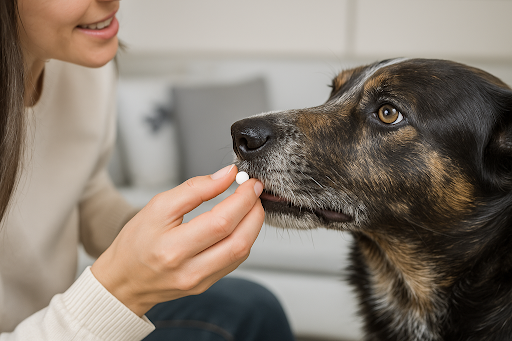Probiotics for Dogs: Boosting Your Pet’s Digestive Health

Key Takeaways
Probiotics can help support your dog’s digestion, immune function, and overall well-being.
Choosing a probiotic with strains like Lactobacillus and Bifidobacterium may benefit dogs, especially those with sensitive stomachs.
Start with a small amount, increase slowly, and monitor for changes in digestion. Always consult your vet before introducing new supplements.
Understanding Probiotics for Dogs
Watching a dog deal with stomach problems is never easy. Those low-energy days, messy cleanups, and appetite changes are hard to ignore. Dog owners often look for simple ways to support their pet’s health, especially when they’re not acting like themselves.
That’s where probiotics may help. These friendly bacteria support your dog’s digestive system and can improve how they feel each day. For helpful articles and expert-reviewed content about probiotics and other pet health topics, PetHealthMD serves as a reliable information resource for pet owners. Always consult your veterinarian if you have concerns about your dog’s diet, digestive health, or whether probiotics are the right fit. Most vets suggest giving dogs between 1 and 10 billion CFUs of probiotics per day. That number might sound big, but the right supplement makes it easy. You can also explore dog digestive health products in the Dog Vitamins and Supplements category.
How Probiotics Support Your Dog’s Health
Digestive issues can affect everything from your dog’s energy levels to their behavior. When their stomach is off, they’re often less playful, more tired, or less interested in meals. Just like humans, dogs need a balance of good bacteria in their gut to stay comfortable and active.
Dogs taking probiotics regularly have fewer stomach problems and better-looking stools. Dog owners also report less gas and more stable behavior. That’s because probiotics help with breaking down food and absorbing nutrients.
Probiotics may also help calm certain dogs who get nervous easily. Since the stomach and brain are closely connected, a healthy gut may have an effect on how dogs handle stress. More research is being done in this area, but early results show potential for added benefits beyond digestion.
In addition to digestion and stress relief, probiotics can help keep your dog’s immune system strong. Many dog owners notice fresher breath and shinier coats after their pet starts using a probiotic regularly. Every dog is different, and how well they respond may depend on their size and overall health. When in doubt, ask your vet for guidance.
Choosing and Introducing the Right Probiotics
If your dog has a sensitive stomach, you may have tried several things already. Probiotics offer a gentle way to support digestion without needing to change your dog’s food or routine too much.
Each dog reacts differently to probiotic supplements. Some may respond quickly, while others take a little longer. It’s helpful to pay attention to changes like how their stool looks, whether they have less gas, and if their appetite improves.
Tips for Choosing a Probiotic
- Look for products that list the bacteria they include. Lactobacillus and Bifidobacterium are two good types.
- Pick a type your dog will take easily. Powders mix into meals, while chews may feel like a treat.
- Follow the directions for storage and use so the probiotics stay active.
Tips for Starting Probiotics
- Begin with a small amount and slowly add more over a week.
- Watch how your dog reacts. Changes like firmer stools or less gas may happen.
- Some dogs may need extra time to adjust. If they seem uncomfortable, lower the amount.
Every dog is different. Some adapt fast, while others need a slower approach. If your dog shows ongoing signs of discomfort, talk to your veterinarian to rule out anything more serious.
Common Questions About Dog Probiotics
Are probiotics safe for my dog?
Yes, probiotics are safe for most dogs. Products like Lactoquil® use gentle strains made to support digestion. Always check with your vet before starting, especially if your dog has medical needs.
How quickly will I notice improvements?
Some changes may show up within a few days. Many owners see benefits like firmer stools and less gas within the first week. Over time, dogs may have better coat quality and more regular digestion.
Which probiotic supplements work best?
Supplements that contain Lactobacillus and Bifidobacterium tend to work well. They are often used during stressful times, and daily probiotics can help with long-term gut support. Look for products that have been tested or recommended by vets. You can browse options in the Dog Probiotics category.
Can probiotics affect my dog’s other medications?
Usually, probiotics are fine to use with medications. Just space them out if your dog is taking antibiotics. Two to three hours apart is best. Always check with your vet if your dog has a health condition.
How should I store and give probiotics?
Keep probiotics in a dry place at 40°F to 75°F. Some types may need to go in the fridge. Follow label directions. Start by giving half the dose for a few days, then increase it slowly.
What side effects might happen?
Some dogs may have more gas or softer stools at first. If problems last more than 48 hours or your dog seems off, reduce the dose or call your vet. More serious issues are rare but should be checked right away.
